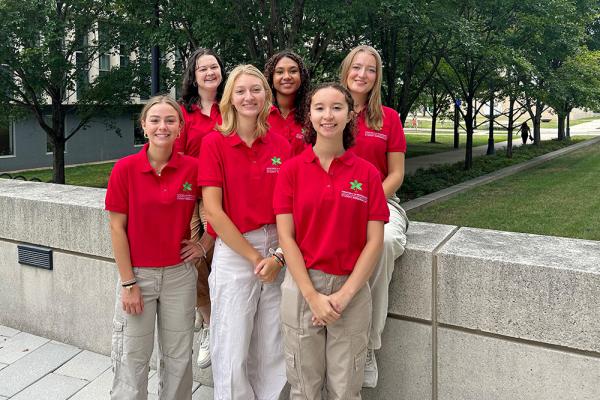Life as an Ohio State psychology student: 'You just learn so much about yourself'

For Scarlet Munoz, the issue of mental health is close to home. When the Ohio State University sophomore was growing up in Sunbury, Ohio, the area was not the wealthy, thriving place it is now, and many families she knew were struggling – both financially and mentally, she said.
“A lot of the kids in my grade didn’t end up going to college,” Munoz explained. “And that’s okay. But also, it was because they got caught in a system where they can’t.”
Now in her second year in the Department of Psychology, where she also serves as a student ambassador, Munoz feels she better understands what she witnessed in her hometown – namely, the profound impact poverty can have on psychological well-being, and the cyclical relationship between the two. She has also found her calling: helping underprivileged communities thrive, particularly by providing mental health resources for youth. Her experience at Ohio State has been critical in helping her pursue these goals, she said.

Munoz comes from a family of Buckeyes and is not the first one to study psychology, one of the College of Arts and Science’s largest majors. Her mother, who graduated in 1994 with her psychology Bachelor’s degree, went on to work in disability services for the state of Ohio. Still, Munoz said she had a limited understanding of what was possible in the field.
“I didn’t really know what psychology was, other than you could be a therapist,” she said. “For some reason, that always really appealed to me, because I just liked talking to people in that way.”
Shortly after starting her freshman year at Ohio State in 2023, she declared the psychology major, assuming she would eventually earn a PhD and open a private counseling practice. But the wide variety of electives available in the Department of Psychology opened her eyes to other possibilities. Through courses in the department’s renowned social psychology area – such as Stereotyping and Prejudice, Psychology and the Law, and I am. The Psychology of Identity and Culture – Munoz learned more about disparities in privilege, rights and opportunity across different populations.
She also continued taking classes in Spanish, which she had studied for six years before college, and was surprised when her language and psychology interests began to intersect. She became aware of barriers that minorities, including many Spanish-speakers, may face when seeking mental health resources, she said.
All of this deeply resonated.
“We never learn about the ways that these communities are being effectively helped, or any efforts toward righting these social injustices,” she said. “I felt so passionate about the fact that underserved communities were being ignored that I realized it was a feeling that I couldn’t leave alone.”
It wasn’t long before she declared Spanish as her second major, knowing that she wanted to spend her career helping expand access to mental health services and that by speaking a second language, she could reach more people.
But while academics have undeniably shaped Munoz’s ambitions, so has her life outside the classroom on the university’s sprawling campus – a place that once intimidated her, she admits. The entire population of Sunbury is about the same size as the university’s typical incoming freshman class (in autumn 2024, a record 9,530 students started at Ohio State).
Wanting to stretch her comfort zone, Munoz joined multiple clubs at the semi-annual Student Involvement Fair, where a whopping 1,400 student organizations were represented. Among other activities, she signed up for the Ohio State chapter of Camp Kesem, which facilitates a summer camp for children of cancer patients. As one of six student ambassadors in the Department of Psychology, Munoz also works to make fellow undergraduates feel welcome and fosters student-faculty connections through a department book club. In one of the club’s recent meetings, Dr. Kristin Supe led participants in a discussion about the joys and perils of synesthesia in neurologist Guy Leschziner’s The Man Who Tasted Words.
“I feel like going [to Ohio State], you just learn so much about yourself within even the first semester, because there’s so much to do,” Munoz said, reflecting on her campus involvement.
She later added: “How big the school feels – it shrinks really fast.”
But one of the most transformative experiences for Munoz has been her role as a coach in the Student Wellness Center. Alongside about 35 other volunteers, she helps fellow students set goals, make positive changes in their lives and find balance among different kinds of wellness: career, creative, digital, emotional, environmental, financial, intellectual, physical, social and spiritual.
The position has given Munoz hands-on, practical training that she said she can’t imagine getting anyplace other than Ohio State, as well as inspiration for a future career: providing mental health services at schools. Mental healthcare can be prohibitively expensive for families, she said, and children often view school as a safe space. At the same time, educators often lack the means to adequately attend to students’ psychological wellbeing.
It’s a need she also witnessed among her peers growing up, and now, Munoz feels she can help fill this gap.
“I think if schools were able to provide these resources to their kids, they would be so much more successful with allowing these kids to then succeed,” she said.

